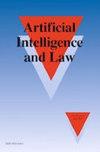链接开放数据的可决策框架中的法律合规性检查模式
IF 3.1
2区 社会学
Q2 COMPUTER SCIENCE, ARTIFICIAL INTELLIGENCE
引用次数: 5
摘要
本文提出了一种在语义网中进行法律合规性检查的方法,该方法可以有效地应用于链接开放数据环境中的应用程序。它基于本体类和本体属性限制对道义规范进行建模。还展示了这种方法如何处理规范的可否决性。这种方法是由OWL2的可判定片段实现的,而法律推理是由可用的可判定推理器进行的。该方法是通过提供用于建模道义规范和规范合规性检查的模式来概括的。本文章由计算机程序翻译,如有差异,请以英文原文为准。
Patterns for legal compliance checking in a decidable framework of linked open data
This paper presents an approach for legal compliance checking in the Semantic Web which can be effectively applied for applications in the Linked Open Data environment. It is based on modeling deontic norms in terms of ontology classes and ontology property restrictions. It is also shown how this approach can handle norm defeasibility. Such methodology is implemented by decidable fragments of OWL 2, while legal reasoning is carried out by available decidable reasoners. The approach is generalised by presenting patterns for modeling deontic norms and norms compliance checking.
求助全文
通过发布文献求助,成功后即可免费获取论文全文。
去求助
来源期刊

Artificial Intelligence and Law
Multiple-
CiteScore
9.50
自引率
26.80%
发文量
33
期刊介绍:
Artificial Intelligence and Law is an international forum for the dissemination of original interdisciplinary research in the following areas: Theoretical or empirical studies in artificial intelligence (AI), cognitive psychology, jurisprudence, linguistics, or philosophy which address the development of formal or computational models of legal knowledge, reasoning, and decision making. In-depth studies of innovative artificial intelligence systems that are being used in the legal domain. Studies which address the legal, ethical and social implications of the field of Artificial Intelligence and Law.
Topics of interest include, but are not limited to, the following: Computational models of legal reasoning and decision making; judgmental reasoning, adversarial reasoning, case-based reasoning, deontic reasoning, and normative reasoning. Formal representation of legal knowledge: deontic notions, normative
modalities, rights, factors, values, rules. Jurisprudential theories of legal reasoning. Specialized logics for law. Psychological and linguistic studies concerning legal reasoning. Legal expert systems; statutory systems, legal practice systems, predictive systems, and normative systems. AI and law support for legislative drafting, judicial decision-making, and
public administration. Intelligent processing of legal documents; conceptual retrieval of cases and statutes, automatic text understanding, intelligent document assembly systems, hypertext, and semantic markup of legal documents. Intelligent processing of legal information on the World Wide Web, legal ontologies, automated intelligent legal agents, electronic legal institutions, computational models of legal texts. Ramifications for AI and Law in e-Commerce, automatic contracting and negotiation, digital rights management, and automated dispute resolution. Ramifications for AI and Law in e-governance, e-government, e-Democracy, and knowledge-based systems supporting public services, public dialogue and mediation. Intelligent computer-assisted instructional systems in law or ethics. Evaluation and auditing techniques for legal AI systems. Systemic problems in the construction and delivery of legal AI systems. Impact of AI on the law and legal institutions. Ethical issues concerning legal AI systems. In addition to original research contributions, the Journal will include a Book Review section, a series of Technology Reports describing existing and emerging products, applications and technologies, and a Research Notes section of occasional essays posing interesting and timely research challenges for the field of Artificial Intelligence and Law. Financial support for the Journal of Artificial Intelligence and Law is provided by the University of Pittsburgh School of Law.
 求助内容:
求助内容: 应助结果提醒方式:
应助结果提醒方式:


